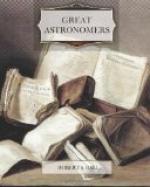The labours, both in the discovery and measurement of the double stars, and in the discussion of the observations with the object of finding the orbits of such stars as are in actual revolution, received due recognition in yet another gold medal awarded by the Royal Society. An address was delivered on the occasion by the Duke of Sussex (30th November, 1833), in the course of which, after stating that the medal had been conferred on Sir John Herschel, he remarks:—
“It has been said that distance of place confers the same privilege as distance of time, and I should gladly avail myself of the privilege which is thus afforded me by Sir John Herschel’s separation from his country and friends, to express my admiration of his character in stronger terms than I should otherwise venture to use; for the language of panegyric, however sincerely it may flow from the heart, might be mistaken for that of flattery, if it could not thus claim somewhat of an historical character; but his great attainments in almost every department of human knowledge, his fine powers as a philosophical writer, his great services and his distinguished devotion to science, the high principles which have regulated his conduct in every relation of life, and, above all, his engaging modesty, which is the crown of all his other virtues, presenting such a model of an accomplished philosopher as can rarely be found beyond the regions of fiction, demand abler pens than mine to describe them in adequate terms, however much inclined I might feel to undertake the task.”
The first few lines of the eulogium just quoted allude to Herschel’s absence from England. This was not merely an episode of interest in the career of Herschel, it was the occasion of one of the greatest scientific expeditions in the whole history of astronomy.
Herschel had, as we have seen, undertaken a revision of his father’s “sweeps” for new objects, in those skies which are visible from our latitudes in the northern hemisphere. He had well-nigh completed this task. Zone by zone the whole of the heavens which could be observed from Windsor had passed under his review. He had added hundreds to the list of nebulae discovered by his father. He had announced thousands of double stars. At last, however, the great survey was accomplished. The contents of the northern hemisphere, so far at least as they could be disclosed by his telescope of twenty feet focal length, had been revealed.




